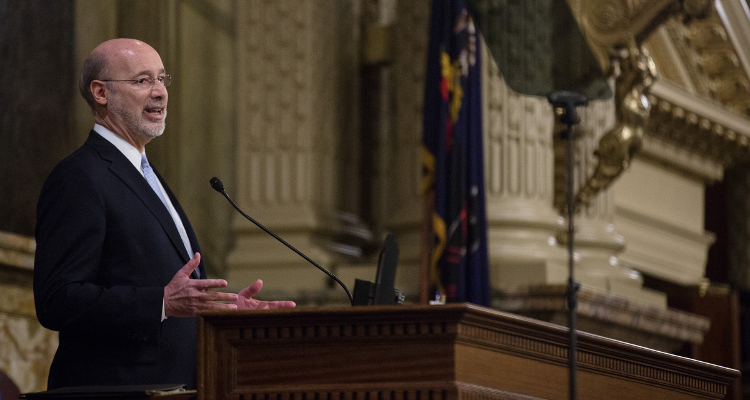The long-running debate on whether to legalize online casinos and daily fantasy sports wagering in Pennsylvania took an unexpected turn yesterday after governor Tom Wolf revealed that his budget proposal for the next fiscal year is set to include $250 million in additional funds generated by “gaming expansion”.
In his budget address to the Pennsylvania General Assembly on Tuesday, the Democratic governor stated that his planned $81 billion budget for the twelve months from July 1 would include $32.3 billion raised from state taxes including $1 billion in new duties targeted mainly at business interests.
Pennsylvania is facing a nearly $3 billion historical budget deficit and Wolf revealed that this new cash is set to include $100 million produced by “gaming expansion” between now and the end of June along with a further $150 million in “gaming expansion” funds collected over the subsequent twelve-month period.
“As part of the final 2016-2017 budget agreement, the legislature committed to enacting a gaming expansion proposal that would generate $100 million in the current fiscal year,” read the executive brief of Wolf’s budget. “This commitment continues to be reflected in the 2017-2018 budget, which further proposes an additional $150 million in revenue from gaming expansion for the budget year.”
However, 68-year-old Wolf did not specifically denote what he meant by “gaming expansion” with industry experts explaining that this could include the possibility of legalizing video lottery terminals at private establishments, increasing current casino taxes or permitting race tracks, off-track betting parlors and airports to offer slots.
“Given developments within the legislature, the governor’s proposed budget does not put forth a specific proposal for expansion but merely assumes revenues within the current ideas being discussed,” read the executive brief.
But, it is thought that the fastest way to raise $100 million before July would be to permit online gambling along with daily fantasy sports wagering and last month saw Jay Costa, who represents parts of Pittsburgh in the Pennsylvania State Senate, file a memo that detailed his intention to propose legislation that would bring about just such a move. Set to mimic last year’s failed House Bill 1887, he declared that his new measure would require online casino operators to pay a $10 million licensing fee in order to offer slots and table games such as poker while technology providers would be subject to a $5 million duty.
The 59-year-old’s proposed legislation could moreover set a gross gaming revenues tax rate of 25% while daily fantasy sports operators would be required to stump up $2.5 million for a license.
Both houses of the Republican-controlled Pennsylvania General Assembly will now begin five months of debate on Wolf’s proposed budget while each are to additionally launch several weeks of hearings on the plan from February 21.



